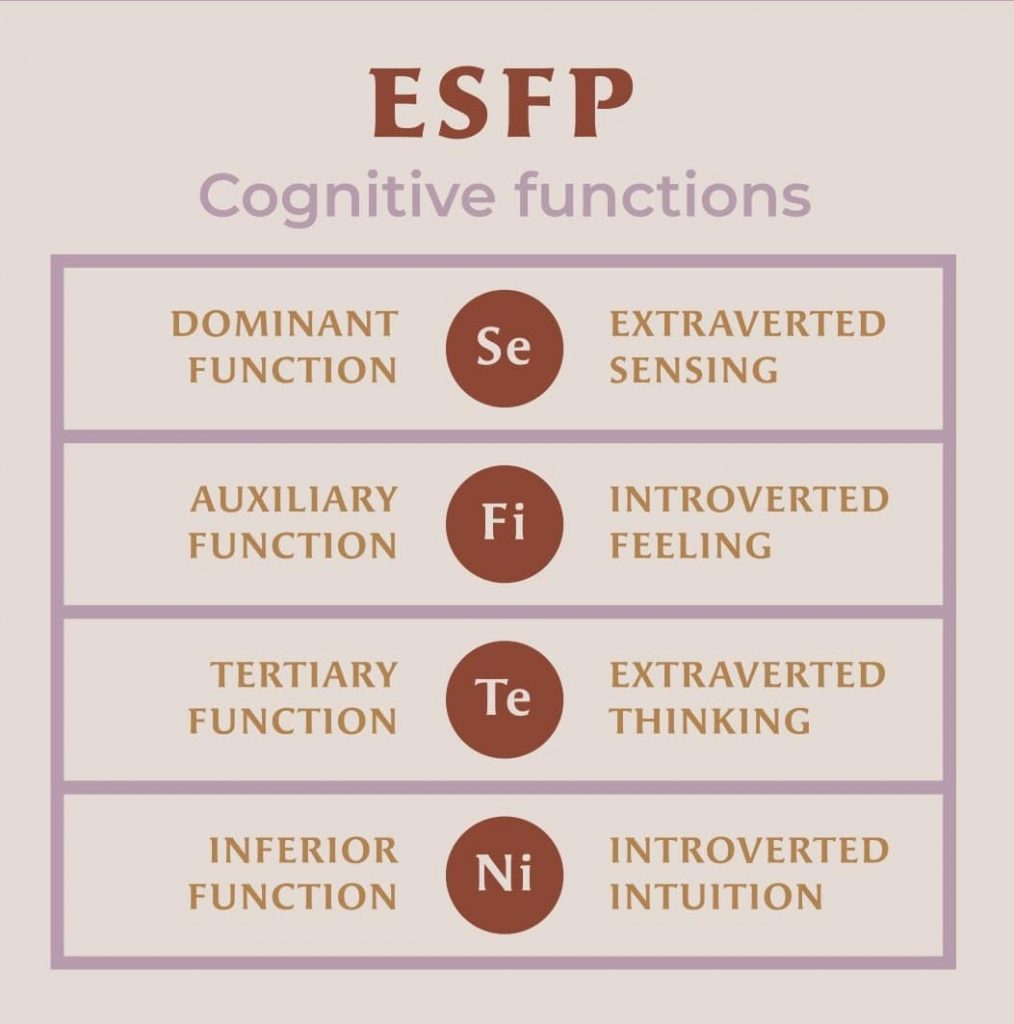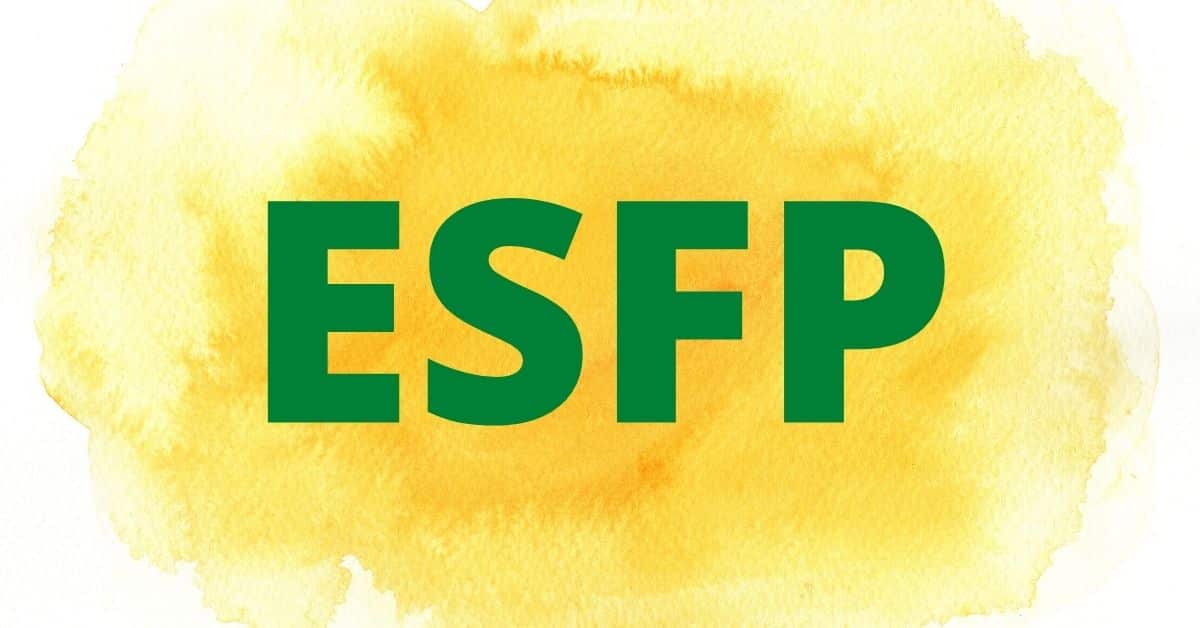ESFP – The Entertainer
ESFP Meaning:
ESFPs are one of the more common of the 16 Myers-Briggs personality types, consisting of approximately 9 percent of the population, with 10 percent being women and 7 percent men. The ESFP personality type consists of Extraverted, meaning they derive their energy from engaging with other people and the outside world, Sensing, in that they prefer to use information obtained directly through the five senses, Feeling, in that they make their decisions based primarily out of feeling as opposed to exclusively based on facts and rules, as well as Perceiving, in that they are not rigid or necessarily organized in any given approach, and prefer to work with new information as it presents itself.
Other names for the ESFP include the Entertainer and the Performer, and with good reason. The ESFP has a magnetic and captivating personality that truly feeds off being with and in front of others. They can interact and engage with people seemingly effortlessly, regardless of the personality type. They are generally considered to be highly emotionally intelligent in that they are deeply attuned with the emotions, thoughts, and feelings of others.
Given their Sensing, Feeling, and Perceiving traits, ESFPs have a tendency to live life on impulse, embracing the world as it is, as it comes, and as they perceive it. They also tend to be incredibly trusting and open with others. Whether it is an exciting stranger or a life-long friend, the ESFP can be rather candid and honest. However, the ESFP possesses the unique ability to come across as very genuine and sincere in their frankness and does not feel the need to hide or censor their own truth.
ESFPs also have the ability to garner the trust of others very quickly. This ability to have others open up to them makes them a hub of information within social circles and work environments. They are usually well-liked and respected and tend to be optimistic and cheerful with an overt vivacity and lust for life.
However, the ESFP’s spontaneous and bold lifestyle may also be perceived as irresponsible and risky to the more reserved personality types, particularly those who have a tendency for Judging. However, this does not deter or dissuade the ESFP, as they fundamentally refuse to let the judgment and inhibition of others bring or slow them down.

ESFP and Career:
The ESFPs thrive and excel in work environments that are busy, lively, and energetic. ESFPs make for particularly effective customer service and customer relations specialists, as there are endless opportunities to meet and interact with coworkers and new people daily. They can clue into the wants and needs of others and quickly discern how they are being received. With this information, they are able to quickly adapt or flex their style to come across much more agreeable.
Given their Perceiving tendency, they are not fond of rigidly structured work environments, finding them stiff and socially suffocating. As ESFPs prefer to work in the now, they do not tend to have long-term (and sometimes even short-term) goals. The ESFP has confidence in their adaptability and finds it exhausting having to plan or worry about the future. However, to the more Judging personality types, this can be construed as being disorganized, unambitious, and an impression of looking lost.
The ESFP is also very realistic and prefers to be challenged with realistic and practical problems instead of problems that deal within the realm of the abstract and theoretical.
ESFP as Direct Reports:
The ESFPs are almost guaranteed to be the center of attention within any given team. Their positivity and enthusiasm are nothing short of infectious. They can lighten any mood or work with their upbeat and happy-go-lucky temperament.
ESFPs are intent on bringing fun and play into their work, and it is usually deeply appreciated by their peers. However, an unintended perception that can arise is that the ESFPs do not take their work seriously by both their more Thinking and Judging colleagues, as well as their leaders. However, this is usually not the case as the ESFP still takes their work very seriously and raises the morale and engagement of those around them.
ESFPs tend to shy away from conflict, and therefore prefer to stray away from competitive work environments and competitions within the team. They much prefer to work with their team members to achieve a common goal or task, entertaining and inspiring them all along the way.
ESFP as Leaders of Others:
As leaders of others, ESFPs appreciate the title and the responsibility associated with it. They enjoy being the driving force of any given team, providing it with direction. They are able to infuse any task or goal with a purpose that the team can rally behind and toward. They are light-hearted, caring, and nurturing of their direct reports and often establish amicable relationships.
While these relationships can definitely assist in engaging the team and allows the ESFP to utilize their emotional intelligence to ensure employee satisfaction, it also runs the risk of blurring the line between leader and friend. This is especially true given the ESFP’s conflict aversion and their preference to be well esteemed and liked by their team. The ESFP may avoid making a difficult decision or having a difficult conversation to maintain relationships, which undoubtedly causes a strain amongst the rest of the group.
The ESFP is usually much more effective within the context of a smaller team where they can establish and tend to their relationships often. However, the larger the group becomes, the less opportunity there is for one-on-one conversations and the less opportunity to engage and motivate on a personal level. ESFPs are most effective when face-to-face and when their genuine enthusiasm can be seen and can be shown, and when they are able to read and respond to their audience on a real-time basis.
ESFP Professions:
The ESFP, therefore, has a strong profile that lends well to a variety of professions and careers. Given their tendency for Sensing, ESFPs have the potential to be highly creative and successful artists, such as Photographers, Musicians, Artist, Fashion Designer, Singer, and Song-writers.
Also, any career that deals with interacting with and meeting people is especially apt for the ESFJ and can include, Elementary Teacher, High School Teacher, College Professor, Special Education Teacher, Social Worker, Flight Attendant, Hotel Receptionist, Corporate trainer, among many others. However, this is not to say that the ESFJ will be an instant success in any one of these given professions or careers. Instead, it is to say that these professions and careers resonate on a fundamental level with the core values and tendencies of the ESFJ.
Given this, then it also follows that there will also be professions or careers that the ESFJ may not be as particularly compatible with. These typically include those that are not people-focused or require long-term vision or planning, including Systems Analyst, Attorney, Judge, Auditor, Economist, and most of the STEM-related industries or professions.
Again, it is not to say that the ESFJ will not necessarily be practical or excel at any one of these give positions. However, they will most likely be more challenging on a fundamental and core level.
ESFP and Interpersonal Relationships:
ESFPs thrive in interpersonal relationships. They can be the life of the party, the supportive listener, or the devil’s advocate. Whatever the situation calls for (and the ESFP will know), they will be able to adapt and be exactly what any given context calls for. This is their true talent, in that they are social chameleons that are compatible anywhere at any time.
This is not to say that the ESFP is invincible in social settings. However, they usually know precisely what to say and when to say it.

ESFP in Friendships:
In friendships, the ESFP tends to seek out those who are as enthusiastic, positive, and cheerful as themselves. They enjoy being with other personality types that are also extraverted and appreciate spontaneity and living life to the fullest. ESFPs have a particular affinity to different personality types that share their preference for Sensing. They include the ISFP (Introvert, Sensing, Feeling and Perceiving), the ESTP (Extravert, Sensing, Thinking and Perceiving), the ESFJ (Extraverted, Sensing, Feeling and Judging), and, of course, fellow ESFJ’s.
Like professions and personality types, this is not to say that these relationships will be instantly successful or prosperous. However, there is a more significant opportunity to bond over fundamental similarities in beliefs and values.
The same applies to potentially clashing personalities. The ESFP may find it to be particularly challenging to find common ground with those personality types who are more inclined to Intuition as opposed to Sensing and include the INTP (Introvert, Intuitive, Thinking and Perceiving), the INTJ (Introvert, Intuitive, Thinking and Judging), INFJ (Introvert, Intuitive, Feeling and Judging), and the ENTJ (Extravert, Intuitive, Thinking and Judging).
ESFP in Romantic Relationships:
In romantic relationships, the ESFP tends to be very open and communicative with their partners. They are nurturing and highly caring and appreciate a partner who is as well. They are most at ease with a partner who is just as spontaneous as themselves, always along to pursue the next whim or fancy. This composition works well until it becomes at odds and clashes with higher responsibilities in their lives. If an ESFP is with a similar personality, they must pay special heed to ensure their lifestyle is balanced and requires conscious effort to plan and organize. ESFPs can also benefit from a much more structured and organized partner and one who can relate to and appreciate the ESFPs’ fast-paced and fancy-free lust for life. These personality types can assist in reigning the ESFP in and reminding and emphasizing them of the value of responsibility and the semblance of structure in their lives.
ESFP and Families:
ESFPs instill this same appreciation for the here and now into their children. ESFP’s tend to be fun, interactive, and present parents. They take an extraordinary pride in their children and appreciate when they can enjoy the world alongside them. However, the ESFP does run the risk of being too lax and fun-loving with their children, often avoiding imposing rules or neglecting to perform necessary discipline.
This aversion is also another example of why the ESFP benefits from being with a more structured partner. A more structured partner will not only empahasize structure and rules to the ESFP; they will also instill it within the family and the household as well.
Conclusion:
The ESFP is a fiery and enigmatic personality type that possesses innate abilities and is exceptionally people-centric. They can make fast and lasting friends with a large variety of other people. They are open and communicative and love to live in the here and now. They feel smothered and stifled by structure and rules and do not have much in the way of patience for the realm of theory and the abstract.
They love to entertain and interact with others and, as such, gravitate towards primarily people-focused careers. ESFPs. They are also renowned for their profound lust for life and prefer to associate with others with similar views and beliefs. ESFPs bring fun and spontaneity to relationships with others and their families. However, they should be careful and mindful of the importance of rules and higher responsibilities.
You can find information on famous people with ESFP personality types such as celebrity actors, sportsmen, characters and other historical characters with this personality type.







